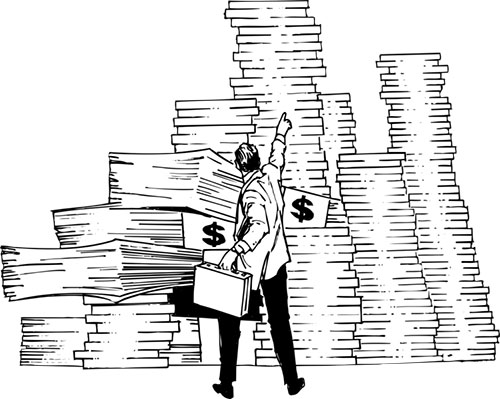Talking about Work:
Jobs and Money
 |
Click to get this lesson as an Adobe Acrobat file for printing or use in a class. |
The difference between work and a hobby is that you get paid to work. If you're lucky, you will like working as much as you like your hobbies, but you're there for the money.
Click Here for Step-by-Step Rules, Stories and Exercises to Practice All English Tenses
Even if we have jobs we like, most of us are really there for the income. And if we have jobs we don't like—I worked for a summer in a factory—the income can be depressing. Getting my first paycheck from the factory and seeing how much of my hard-earned money went to taxes was terrible!
How important is the pay to you in your work? Do you think you earn enough for the work you do? Do you know anyone who earns too much for the work he or she does? Do you know how much of your pay goes to taxes? Isn't it depressing?

Vocabulary
Pay / Paid: Do you
work for free? Of course not! You get money for the
work that you do. When someone gives you money for something else, they pay you.
Your work, I hope, pays you.
But also, if you buy a car, you pay for the
car. Paying is so
important that the word pay also
means the money you get for working. "The work is bad," you might say, "but the pay is
good." Your pay is
sometimes the same as your income.
The past tense of pay is paid: "He paid me for
the car, yesterday."
Money: Whether you go to work for dollars, Euros, or Yen, you're at work for money. Money is what you use to pay for the things that really matter in life: like an apartment and food. Money is what your pay is made of.
Income: In the
U.S., we have to report to the government how much money we earned in the
last year for our taxes. The money you earn in one
year is your income. The tax you pay
on your income is your income tax.
Income is more
than just pay. Income is all
of the money that
you get in a year. Your pay, for starters,
but if you sell a lot of things, that money is income, too. If you
have a house or apartment that you rent to someone else, that's income, too. For me, it
seems like my income is
never enough and my income tax is too
much!
Paycheck: A "check" is a piece of paper that you can take to the bank to get money.
My wife says that checks don't exist in Europe, anymore. But, in the
U.S., you can still use a check to give someone else money. If I have
money in the bank, I can write a check, give it to another person, and
they give it to their bank. Then, their bank takes the money out of my
account.
When your work pays you
with a check, it's your paycheck. And your paycheck is so
important that we even have a name for the day when you get your paycheck: it's "payday."
In the U.S., a paycheck will
include how much money you get, but it will also tell you how much
money you earned and how
much of it went to taxes.
Now, jobs mostly just put your money in the
bank for you. But on payday, they give you a piece of paper with the
information about how much you earned and how
much you paid in taxes. That paper is
still called a paycheck, even though the
bank won't give you money for it.
Earned: Imagine
you agree to work for €10/hour. After eight hours of work, your boss
gives you €70. Is that fair? Of course not, you earned €80.
When you do work for €80, you earn €80. Of course,
when you earn €80
you're never paid €80. A
lot of your pay goes to taxes.
When you get something for what you've done, we say you've earned it.
Normally, we talk about earning money; after all, we
spend a lot of time trying to earn money. But you can also earn a
nickname, like "Stinky," or a reputation, maybe as a hard-worker.
Taxes: You never keep all of the money that you earn. You always have to pay some money to the government. How much money you give to the government usually depends on how much income you have. The money that the government gets is called taxes. Taxes are the money that the government uses to pay for schools and police and things like that.
Get Updates, Special Offers, and English Resources
Download your FREE GIFT (the first two chapters of
English Short Stories Book and Workbook)
as soon as you join!

By submitting your email, you consent to receiving updates and newsletters from us and to the sharing of your personal data with third parties for the purposes of sending you communications. We will not spam you. You can unsubscribe at any time. For more information, please see our privacy policy.





